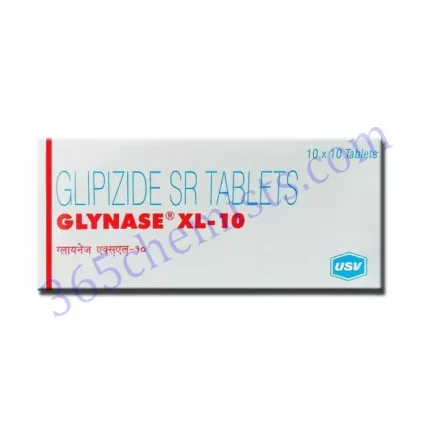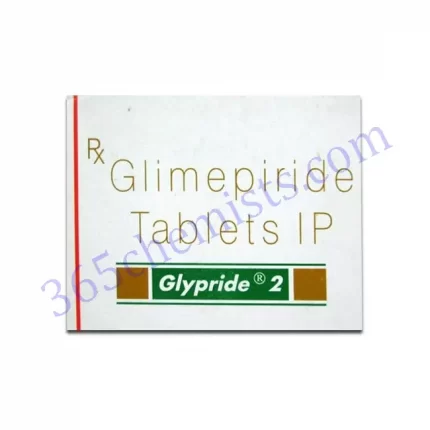Introduction
Glimepiride and metformin are both ingredients in the combo drug Amaryl MV Tablet. It helps maintain blood sugar levels and is used to treat type 2 diabetes. This drug combines the advantages of glimepiride, which increases pancreatic insulin release, with metformin, which increases insulin sensitivity and lowers glucose synthesis in the liver.
How Amaryl MV Tablet Works
- Sulfonylureas are a group of drugs that includes glimepiride. It functions by causing the pancreas to release more insulin, which lowers blood sugar levels. This enhances glycemic management and lowers the possibility of problems brought on by high blood sugar levels.
- Metformin: A group of drugs known as biguanides includes metformin. It functions by lessening the liver’s ability to produce glucose and enhancing how well the body reacts to insulin. It also aids in reducing the intestinal absorption of glucose. These actions help to increase insulin sensitivity and lower blood sugar levels.
Dosage and Administration
You should take the Amaryl MV Tablet exactly as directed by your doctor. Depending on a person’s needs and how they respond to treatment, the dosage may change. To lower the risk of gastrointestinal adverse effects, it is typically taken orally with meals. It’s crucial to adhere to your doctor’s directions and not take more medication than is advised.
Related Product
Amaryl 1mg Tablet
Amaryl 2mg Tablet
Amaryl 3mg Tablet
Amaryl M 1mg Tablet
Amaryl M 2mg Tablet
Amaryl M Forte 1mg Tablet
Amaryl M Forte 2mg Tablet
Amaryl MV 1mg Tablet
Amaryl MV 2mg Tablet
Precautions and Warnings
- Hypoglycemia: Amaryl MV Tablet may cause hypoglycemia (low blood sugar) by lowering blood sugar levels. Regularly checking your blood sugar levels is crucial. You should also be aware of the warning signs and symptoms of hypoglycemia, which include confusion, shakiness, sweating, and dizziness. Consuming a source of glucose, such as fruit juice or glucose pills, can help boost blood sugar levels if hypoglycemia develops. It is essential to talk with your healthcare professional about managing hypoglycemia.
- Kidney and Liver Function: People with compromised kidney or liver function should use Amaryl MV Tablet with caution. To ensure that the drug is both safe and effective for you, your healthcare professional may change the dosage or take into account other treatment choices.
- Medications you are currently taking, including prescription, over-the-counter, and herbal remedies, should be disclosed to your doctor. Amaryl MV Tablet may interact with some drugs, such as certain antibiotics, diuretics, and blood pressure medications, reducing their efficacy or raising their risk of side effects. Potential drug interactions can be assessed by your healthcare provider, who can then modify your treatment plan as necessary.
Side Effects
- Common Adverse Reactions: The use of Amaryl MV Tablet may result in a number of common adverse reactions, such as nausea, diarrhoea, upset stomach, and headache. These negative effects are often minor and temporary, and they may go away as your body becomes used to the medicine.
- Hypoglycemia: Taking Amaryl MV Tablets can make you more likely to experience this condition. It is crucial to periodically check your blood sugar levels and to exercise caution if you want to further lower them through prolonged fasting or strenuous exercise.
Important Information
Please let your doctor know if you have any health issues prior to taking Amaryl MV Tablet, such as liver or kidney disorders, cardiac issues, or a history of pancreatitis. Tell them about any prescription, over-the-counter, and herbal medications you are currently taking as well because they might interact with Amaryl MV Tablet.
How to Take Amaryl MV Tablet
- Follow the dosage and administration guidelines provided by your doctor when taking Amaryl MV Tablet. Depending on your blood sugar levels and unique reaction to therapy, the dosage may be changed.
- Management: Amaryl MV To reduce the risk of stomach distress, tablets are often taken orally after a meal. With a glass of water, completely assimilate the tablet. Unless otherwise instructed by your healthcare provider, do not chew or crush the tablet.
Monitoring and Safety
Blood Sugar Monitoring: Follow your healthcare provider’s instructions and routinely check your blood sugar levels. This will enable any necessary modifications to your treatment plan and help ensure that the medicine is successfully regulating your blood sugar levels.
Be aware of hypoglycemia: Amaryl MV Tablet may drop your blood sugar levels, which could lead to hypoglycemia. Recognise the warning signs and symptoms of low blood sugar, such as shaking, sweating, confusion, and hunger. If you experience these symptoms, boost your blood sugar levels by ingesting a source of glucose, such as fruit juice or glucose tablets. For more information on controlling hypoglycemia, speak with your healthcare practitioner.
Potential Side Effects
Amaryl MV Tablet side effects that are prevalent include nausea, diarrhoea, upset stomach, headaches, and dizziness. The majority of the time, these side effects are minor and transient; however, if they linger or get worse, speak with your doctor.
allergy responses: Amaryl MV Tablet sometimes may result with allergy responses. If you have symptoms like a rash, itching, swelling, severe dizziness, or breathing difficulties, you should get medical help right once.
Precautions and Contraindications
Breastfeeding and Pregnancy: Let your doctor know whether you are currently breastfeeding or planning a pregnancy. Your healthcare provider should be consulted about the risks of using Amaryl MV Tablet during pregnancy and breast-feeding as it may affect the developing foetus or infant.
Surgery and medical procedures: Let the medical staff know that you are taking Amaryl MV Tablet if you have an upcoming surgery or medical treatment. It could be necessary to temporarily cease or modify the medicine in order to avoid any difficulties during the surgery.
Conclusion
Glimepiride and metformin are both included in the combination drug Amaryl MV Tablet, which is used to treat type 2 diabetes. It enhances glycemic management and aids in blood sugar regulation. The medication must be taken exactly as directed, blood sugar levels must be checked frequently, and a healthy lifestyle consisting of a balanced diet and regular exercise must be adopted. Successful diabetes treatment depends on following the advice of your healthcare practitioner and maintaining open lines of communication. Consult your healthcare practitioner for advice and support if you have any worries or suffer any negative effects.












